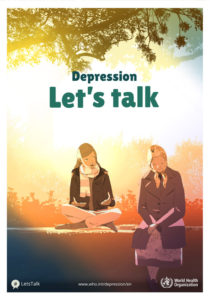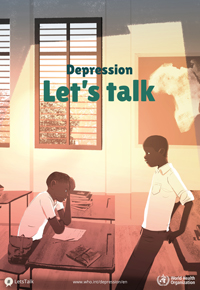The World Health Organization (WHO) states, “Depression is the leading cause of ill health and disability worldwide”, and that “Even in high-income countries, nearly 50% of people with depression do not get treatment.” Since a fear of stigma can result in people not seeking treatment, this year’s WHO campaign aims to reduce stigma about depression by talking about it.
I treat people for depression in my clinical practice. Depression can be transitory, or it can last for years. It can have a biological/chemical/hormonal origin or it can arise from a difficult life event such as trauma, the death of a loved one, loss of a job, or loss of a significant relationship.
Whatever its origin or trajectory, it’s treatable. How each individual’s depression arose and is manifested is unique, however, there are clinically validated treatments for depression. One component of my treatment focus is education. Below are some points from WHO about depression.
Depression: What you should know
2016-2017
If you think you, or someone you know, might be suffering from depression, read on.
What is depression?
- Depression is an illness characterized by persistent sadness and a loss of interest in activities that you normally enjoy, accompanied by an inability to carry out daily activities, for at least two weeks.
- In addition, people with depression normally have several of the following: a loss of energy; a change in appetite; sleeping more or less; anxiety; reduced concentration; indecisiveness; restlessness; feelings of worthlessness, guilt, or hopelessness; and thoughts of self-harm or suicide.
- Something that can happen to anybody.
- Not a sign of weakness.
- Treatable, with talking therapies or antidepressant medication or a combination of these.
What you can do if you think you are depressed
- Talk to someone you trust about your feelings. Most people feel better after talking to someone who cares about them.
- Seek professional help. Your local health-care worker or doctor is a good place to start.
- Remember that with the right help, you can get better.
- Keep up with activities that you used to enjoy when you were well.
- Stay connected. Keep in contact with family and friends.
- Exercise regularly, even if it’s just a short walk.
- Stick to regular eating and sleeping habits.
- Accept that you might have depression and adjust your expectations. You may not be able to accomplish as much as you do usually.
- Avoid or restrict alcohol intake and refrain from using illicit drugs; they can worsen depression.
- If you feel suicidal, contact someone for help immediately.
Remember: Depression can be treated. If you think you have depression, seek help.
WHO Depression: let’s talk campaign
Here is great 4-minute animation about depression produced by WHO.

